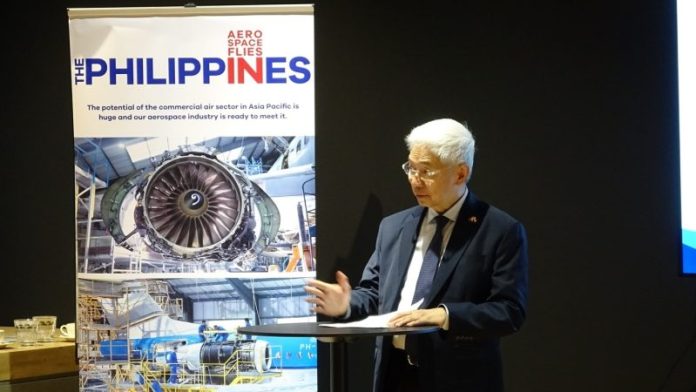
-
The Philippines open to collaborating with the Netherlands to develop both countries’ aviation industry, says Trade Secretary Alfredo Pascual
-
Pascual considers the Netherlands as a gateway for Philippine carriers to expand their European operations given that country’s status as a major European hub
-
He cites the two countries’ potential enhancement of bilateral trade in semiconductors and high-technology, agri-food processing, and infrastructure
The Philippines is open to collaborating with the Netherlands in developing the aviation industry in both countries, according to Trade Secretary Alfredo Pascual.
“The Netherlands has a strong aviation and aerospace infrastructure, with world-class airports, aerospace research facilities, and maintenance, repair, and overhaul (MRO) services,” Pascual said in a keynote speech in a recent roundtable meeting organized by the Philippine Trade and Investment Center in collaboration with the Netherlands Aerospace Group (NAG).
“We are open to collaborate with you in sharing expertise, promoting investments, and strengthening the aviation infrastructure in both countries, enabling us to keep up with global demands.”
NAG is a trade association dedicated to supporting aerospace and aviation companies in the Netherlands by facilitating networking opportunities and accessing broader markets. With over 100 members, NAG account for 95% of the Dutch aviation industry’s revenue. Their primary focus revolves around aerospace and airport development.
Pascual said the Philippine government finds the aerospace and aviation industry significant in the country’s pursuit of economic recovery and expansion.
Developments in this industry do not only generate employment opportunities for Filipinos but also facilitate knowledge transfer and technological development, which, in turn, will help position the Philippines as a key player in the global market.
Pascual also sees the Netherlands as a gateway for Philippine airline companies to expand their operations in Europe given its record as a major European hub. He said this potential link between the two countries can facilitate business and tourism travel, as well as trade and investments between the two countries.
He also cited education and skills development, promotion of sustainable aviation, and the development of space technology and applications as other areas for collaboration.
With the Netherlands’ renowned aerospace engineering programs and research institutions, Pascual said the Philippines will benefit greatly from joint research projects, knowledge exchange, and training programs, building the country’s capacity in this sector.
Pascual said that with a shortage of engineering talent in Europe, opportunities for outsourcing flight simulation, voice, and engineering consultancy were also discussed.
“Our country is positioned to be the hub for manufacturing and aftermarket services in the aerospace industry including aircraft MRO and aerospace manufacturing in the Asia Pacific region,” Pascual said. He boasted that the Philippines is home to Collins Aerospace, the world’s leading aircraft interiors company, and Lufthansa Technik, a top MRO provider.
In a separate meeting with Netherlands Director General for Foreign Economic Relations Hanneke Schuiling, Pascual underscored the potential to enhance bilateral trade relations between the Philippines and the Netherlands in sectors such as semiconductors and high-technology, agri-food processing, and infrastructure.
He noted the growing relations of the Philippines with the Netherlands, with trade growth averaging around 10% annually over the past five years.
He expressed enthusiasm in the first bilateral consultations held between the Philippines and the Netherlands in 2020 after 69 years. As such, Pascual said “there is a need to maintain this momentum as this can work in strengthening the cooperation and commitment from both our countries and put emphasis on trade and investments, water management, maritime matters, agriculture, and science and technology.”
The Philippine delegation also raised the “coordinating authorities or focal points” as outlined in Article 4 of the 1995 Memorandum of Understanding on Economic and Technological Cooperation between the Ministry of Economic Affairs of the Netherlands and Department of Trade and Industry.
The MOU recognizes cooperation in various areas including trade and investment; agriculture; transport and communication; energy; the services sector; environmental technology; and, flood control and land reclamation.
Pascual also expressed his interest in the country becoming to be the sixth priority of the Netherlands for economic cooperation, following the Association of Southeast Asian Nations-5 countries: Indonesia, Malaysia, Singapore, Thailand, and Vietnam.




